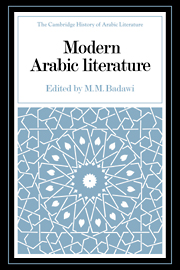Book contents
- Frontmatter
- Contents
- Editorial Note
- Chronological table of events
- Map of the Arab World
- 1 Introduction
- 2 The Neo-classical Arabic poets
- 3 The Romantic poets
- 4 Modernist poetry in Arabic
- 5 The beginnings of the Arabic novel
- 6 The mature Arabic novel outside Egypt
- 7 The Egyptian novel from Zaynab to 1980
- 8 The modern Arabic short story
- 9 Arabic drama: early developments
- 10 Arabic drama since the thirties
- 11 The prose stylists
- 12 The critics
- 13 Arab women writers
- 14 Poetry in the vernacular
- Bibliography
- Index
12 - The critics
Published online by Cambridge University Press: 28 May 2012
- Frontmatter
- Contents
- Editorial Note
- Chronological table of events
- Map of the Arab World
- 1 Introduction
- 2 The Neo-classical Arabic poets
- 3 The Romantic poets
- 4 Modernist poetry in Arabic
- 5 The beginnings of the Arabic novel
- 6 The mature Arabic novel outside Egypt
- 7 The Egyptian novel from Zaynab to 1980
- 8 The modern Arabic short story
- 9 Arabic drama: early developments
- 10 Arabic drama since the thirties
- 11 The prose stylists
- 12 The critics
- 13 Arab women writers
- 14 Poetry in the vernacular
- Bibliography
- Index
Summary
By the eighteenth century, Arab literary criticism had been reduced to blanket judgements, usually unsupported, on the literary qualities of men of learning who earned a place in biographical dictionaries, and to ever more elaborate treatises on rhetoric, especially on that branch of it known as badīʿ, which concerned itself mostly with tropes that exploit not imagery but the forms of words. In prose and poetry alike, it was the ability to juggle with words that was most highly prized.
The challenge set by European powers, first to the Ottomans in the Balkans then more directly through the Bonaparte expedition to Egypt in 1798, was soon to lead to changes that were initially designed to strengthen the armed forces, but that inevitably went on to affect administrative, educational and economic practices in one Arab country after another. Not surprisingly, it was the material benefits of western technology that were most readily accepted – Egypt had a railway line as early as 1854 – whereas an appreciation of its intellectual underpinnings came later, and of European aesthetic perceptions later still.
INITIAL CONSERVATISM
Of the first Arabs to be directly exposed to European life, Rifāʿah Rāfiʿ al-Ṭahṭāwī (1801–73) readily opened his gigantic intellect to new ideas without surrendering his independence of judgement.
- Type
- Chapter
- Information
- Modern Arabic Literature , pp. 417 - 442Publisher: Cambridge University PressPrint publication year: 1993
- 1
- Cited by

